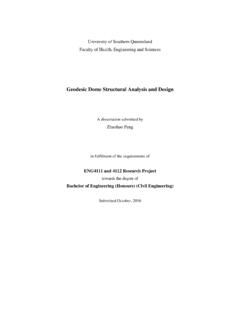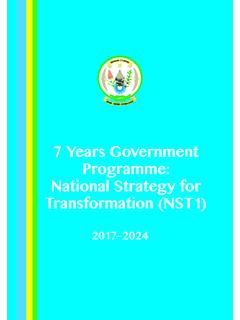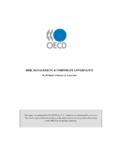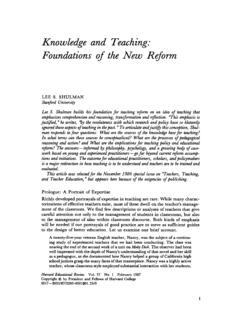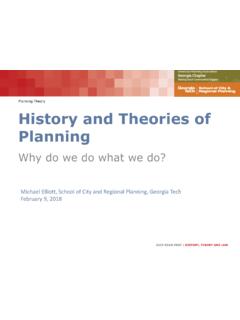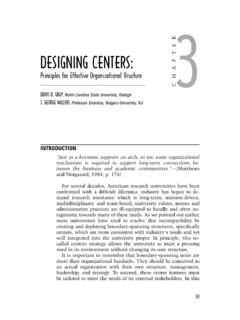Transcription of Influence of teacher characteristics on students’ academic ...
1 Journal of Education and Practice ISSN 2222-1735 (Paper) ISSN 2222-288X (Online). , , 2013. Influence of teacher characteristics on students' academic achievement among secondary schools Anita Kosgei1, Jairo Kirwa Mise2, Odhiambo Odera*3, Mary Evelyn Ayugi4. 1. Moi University, Eldoret, Kenya 2. University of Kerala India, PhD Scholar, University of Kerala (IMK), 3. University of Southern Queensland, Australia and Masinde Muliro University of Science and Technology, Kenya 4. Department of Sociology, University of Nairobi, Kenya *Email of Corresponding author: ABSTRACT. The purpose of this study was to establish the relationship between teacher characteristics and students'. academic achievement. The study was guided by Education Production Function theory (EPF) which connects student academic achievement to teacher characteristics . The study was conducted in Nandi District, Kenya and the target population comprised of teachers of all 26 public secondary schools.
2 The study applied a causal comparative research design. A questionnaire was used for data collection. Data was analyzed using descriptive and inferential statistical techniques. The study findings suggest that there was no significant relationship between teacher qualification and student academic achievement. Key words: teacher characteristics , academic achievement, experience and qualification INTRODUCTION. Education is widely regarded as a basic human right, a key to enlightenment, and a source of wealth and power (Mugenda & Mugenda, 1999). Education is critical to industrial and technological development, with the history of developed nations bearing records of this, developing nations aspiring to realize the same status have to put a premium. UNESCO (1986) indicates that knowledge holds key to the attainment of the millennium development goals, which include, food security, eradication of child mortality, and reduction of the spread of HIV and AIDS.
3 Among others. Ali (2009) observes that there was statistically significant relationship between teacher characteristics and student academic achievement. Adeyemo (2005) notes teacher characteristics influenced teaching and learning in classrooms. Olaleye (2011) establishes that there was relationship between teachers characteristics and pupils performance. Gravestock & Gregor-Greenleaf (2008) states that the explanations for good or poor student's academic performance have been quite exhaustive yet controversy still exists among scholars as to what contribute singly or jointly to students' poor performance. The teacher characteristics found to be dominant in cross-country studies are related to; qualification, experience, attitude and personality. Akinsolu (2010) asserts that availability of qualified teachers determined the performance of students in schools.
4 Coonen (1987) emphasizes that teachers involved in in-service training were more effective in classrooms as compared to teachers who had not undergone training. Wirth & Perkins (2013) indicate that teacher 's attitude contributed significantly to student attention in classrooms whereas Adesoji & Olatunbosun (2008) illustrates that student attitude was related to teacher characteristics . This therefore meant that teacher 's attitude directly affected students' attitude. On teacher personality, Adu & Olatundun (2007) contend that teachers'. characteristics are strong determinants of students' performance in secondary schools. Scholars and researchers generally are in agreement that the school variables, which include teacher administration, perform a critical role in educational achievement than other variables (Patrick, 2005). The important role of the teachers in the learning is unquestionable.
5 Teachers have a lot of Influence on their classroom practices. Teachers should have and apply specific abilities without which their Influence may not be reflected in their students' performance in the subject. For students to be able to make connection between what is taught in school and its application in problem solving in real life, the teacher has to be effective in their teaching. There has been no consensus on the importance of specific teacher factors, leading to the common conclusion that the existing empirical evidence does not find a strong role for teachers in the determination of academic achievement. This study therefore sought to investigate the Influence of teacher characteristics in influencing students' performance. 76. Journal of Education and Practice ISSN 2222-1735 (Paper) ISSN 2222-288X (Online). , , 2013. LITERATURE REVIEW. Concept of teacher characteristics The term teacher characteristics can be referred to as qualities that can be measured with tests or derived from their academic or professional records.
6 They indicate that teacher characteristics does not generally refer to the direct observation of their Influence on students' learning in terms of either students' test performance or teaching behaviors. Rather, the approaches dealt within the scope of this research are those that fall traditionally into the province of personnel psychology or personnel selection. This review deals with those characteristics of teachers that might be identified and used in the initial hiring of teachers to increase their students' achievement. Ashton (1996) indicates that these characteristics could include qualities of teachers that are viewed as personal such as mental ability, age, gender or as experiential such as certification status, educational background, previous teaching experience and the like. Some characteristics are combinations in unknown amounts of personal and experiential qualities, for example; candidates' performance on teacher -certification tests such as the national teacher examinations and state-mandated tests.
7 teacher Qualification and Student academic Achievement Darling Hammond (1998) defines well qualified teacher as one who was fully certified and held the equivalent of a major in the field being taught. Although the formal qualification of teachers is an important indicator for their knowledge and competence in teaching, it has only limited utility in analyzing how well prepared teachers are for what they have to teach in schools. More detailed knowledge of the courses they have taken during their training needs to be compared to the actual content and skills required to teach the high school's curriculum. Ruthland & Bremer (2002) refer to teacher qualification in two ways - traditional and alternative qualification routes. Traditional certification is when an individual completes an undergraduate degree or post graduate program in education. Alternative routes of certification are based on coursework in pedagogy and subject area without a degree in education.
8 Hardy & Smith (2006) cite short term activities such as mentoring, peer evaluations and workshops as ways other than formal qualifications for improving teaching. More often graduates teachers with first degree content go into teaching if they cannot find another job right away. Although they often get somewhat lower salary than a fully qualified teacher ; they choose not to enroll in the one year post- graduate professional training and therefore lack a basic foundation for teaching. Huang & Moon (2009) documents that teacher qualification accounted for approximately 40 to 60 percent of the variance in average of students' achievement in assessment. Richardson (2008) reveals that students in urban areas performed better than those in rural areas. The researcher suggests that the availability of enough qualified teachers must have been a determinant for students' performance.
9 However, in Kenya, some schools in the rural areas have performed better than their urban counterparts (Owoeye & Yara, 2011). Maundu (1986) concludes that there was significant correlation between teacher qualification and pupil performance in Kenya. The good performance was attributed to excellent instructions given by qualified teachers in addition to other inputs. Maundu (1986) establishes that teachers who had graduated from Kenya Science Teachers College were more practically oriented than those who had degrees from public universities. Wilson et al. (2001) suggest that even with the shortcomings of current teacher education and licensing, fully prepared and certified teaches are more successful with students than teachers without this preparation. Ashton (1996) notes that teachers with regular state certification receive higher supervisor ratings and student achievement than teachers who do not meet standards, but this observation was based on data with virtually no statistical controls having been imposed.
10 In spite of the quantity of research on the benefits of teacher certification for student learning, little of the past research exercised controls over student inputs that would give the critical reader confidence in the findings. Laczko & Berliner (2001) assert that the impact of certification status on student achievement in two large urban school districts in the United States of America. These school districts provided information about teachers hired for the 1998-1999 and 1999-2000 school years. Information included the school where they were currently teaching, the grade level taught, the teacher 's certification status, highest degree earned, date and institution where it was achieved, age, and number of years teaching experience. It has been evidenced that in many countries, teacher qualifications that are considered to be related to student learning have become desirable targets of teacher education reform.







